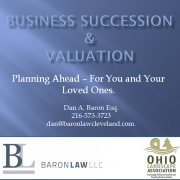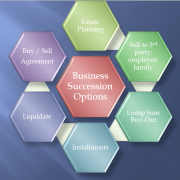What is Business Succession?
Whether you’re planning for retirement or the life of your business after your death, it’s imperative to develop a business succession plan to sooner rather than later. There is no “one plan fits all” when it comes to developing a succession plan for your business. And given that the economy is constantly changing, it isn’t surprising small business owners focus their energies on business survival, future growth, and even remaining active in business after retirement.
Business succession is about three things (1) Estate planning; (2) Retirement; and (3) Risk Management.
Estate Planning
Your estate plan should be incorporated into your business succession plan. What will happen to your company assets after you die? Who will run your business? If you want to provide for your family using your business assets, you should consider at the very least having a last will and testament. Carefully drafting your will allows you to select desired beneficiaries, elect an executor, and transfer your assets through probate. Your family will be going through a difficult time. Setting up a last will and testament in advance helps your family during that difficult time.
Retirement
When thinking about retirement, it’s important to consider your options when selling your business. Will you sell with a lump sum, installments, mix, employee buy-out, or merger? There are numerous options when planning for your retirement and taking advantage of the business you built. Thus, business succession is about planning for your exit strategy. To learn more about your options, visit this article.
Risk Management
Business succession is about limiting your risk. If you have partners within your company, you should be aware of the risks involved. For example, if your partner gets divorced, their spouse is entitled to the partner’s share in the business through the divorce proceedings. If your partner dies, you can now be partners with their spouse or estate. One option to avoid this potential risk is to create a buy-sell agreement through a cross purchase agreement or entity purchase agreement.
Business succession is an important idea that every business owner should consider. Contact your Cleveland, Ohio business succession and estate planning attorney for more information on how to set up your plan. You may also consider contacting Cleveland, Ohio law firm Baron Law LLC at 216-573-3723.



